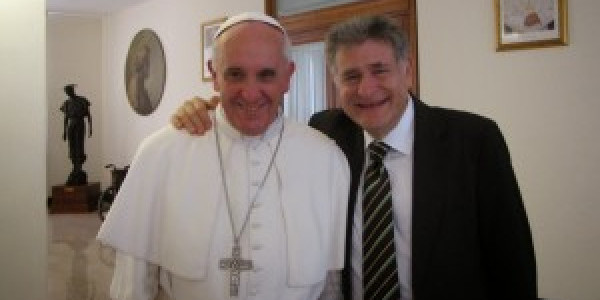Prayers to God in a world on fire
25/09/2022 | Na stronie od 25/09/2022

Source: Rabbi Skorka
Prayers to God in a world on fire
Rosh Hashanah 5783
Fratelli tutti is the encyclical that better presents the core of France’s thought. I remember the passion that he expressed me when we analyze together different paragraphs of it in an encounter we had in Santa Martha on last January 13. The reason of the importance of the encyclical is that in it, the biblical conception regarding the essence of human being and his behavior is used in order to analyze the complicated situation in which Humanity is living in present times.
The conception of a brotherhood relation among all human beings is the direct message that emerges from the fact, described in the first chapters of Genesis, that all humans are descendants from only one couple, Adam and Eve. Unlike the pagan deities which were particular to each people, the God of the Bible is universal. The psalmist summons all peoples to unite and express their rejoicing before God (Psalms 47:2), in the vision of the end of time both Isaiah and Micah envision a relationship of peace among all peoples, Zephaniah (3:9) foresees a time when God will pour out a clear language that will unite humanity in harmony. The God of the Bible, who is one, unites all humanity.
But the book of Genesis teaches about the difficulties that brothers must overcome in order to achieve a harmonious coexistence. Cain and Abel; Isaac and Ismael, Esau and Jacob, formed conflictive relationships that ended in crime, in the first case, or in incomplete reconciliations, as in the other two. Only Joseph, after enormous efforts, overcame the conflict that separated him from his brothers.
The present world shows a humanity in which hatreds separate peoples and hatred covers the biblical vision of human brotherhood.
The Jewish people have two calendars. One that begins with the first day of the month of Nisan, in which Passover is celebrated, commemorating the liberation of the people from their slavery in Egypt. The years of life of a people can only be counted from the moment in which it acquires its freedom. But there is a second calendar, the one that begins on the 1st of Tischrei, which is the day on which God created the human being. It is the universal calendar, according to Jewish tradition. At each beginning of this calendar, the Jewish people raise their prayers for all of humanity, since at that time God judges each and every one of his creatures.
The supplications to the Creator refer to the union of all individuals so that they honor Him by recognizing His greatness, which demands accepting human limits, especially those that many tend to cross, sullying the rights of others.
According to Jewish tradition, the human being can actively participate in the judgment that takes place in the heavenly dimensions. It is through prayer, contrition and actions of charity and support for others, that the severity of God's sentence can be modified. (Talmud of Jerusalem, Taanit 2:1-65b).
Prayer must be understood as a process of introspection and critical analysis of the actions carried out and the attitudes adopted in life, contrition, as the effective production of a change in the being of each one in order to improve their virtues, and charity as the manifestation of consideration for the neighbor, the brother. Through the practice of these three concepts, the human being can transform his identity, improving it.
The sages of the Midrash (Rabbah, Emor 29:12) taught that each one must remake himself, recreate himself as a human being in these days of the new year, so that the condemnation falls on the man of the past and only blessings are for the man of the future. In the same way, a new world can be recreated by everyone together with God, as it says in Isaiah 66:22.
The image of a God who dispenses justice and works with mercy towards humans is strange in the face of the violence, destruction and inequity that fill the reality of the present. How to have faith in it in the midst of a world on fire? The sages of the Talmud inquired the same question. Their responses range from the fact that justice and mercy are only revealed in another reality (Olam Haba, world to come), or to the fact that it is something incomprehensible to human reason. But without that belief, life is meaningless and existence is a torture. In a famous rabbinical discussion about what is the biblical expression that summarizes the essence of the precepts ordained by God, it concludes the verse of Habakkuk (2:4): "the just shall live by his faith" (Makkot 24, a) expresses the essential meaning of all the precepts.
The world is on fire. The insane arrogance sows new corpses and destruction in multiple areas of the planet. The ancient plea for contrition will be recited again in the synagogues to welcome the year 5783, redoubling the ancient hope in the formation of a world of peace, in which each finally recognizes a brother in the other.
Shanah Tova Umevorkhet!
Abraham Skorka
Georgetown University, Washington, DC
Published in L'OSSERVATORE ROMANO , September 24th, 2022.